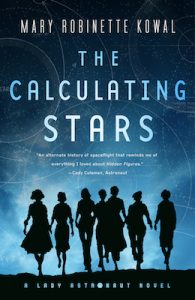The Calculating Stars by Mary Robinette Kowal (Book Review)
 Late last year, I finally got around to reading Mary Robinette Kowal’s novelette, The Lady Astronaut of Mars. I instantly fell in love with Elma and Nathaniel. It is such a beautiful story and brought me to tears at the end. So, of course, I asked my husband to get me the Lady Astronaut books for Christmas, and he obliged.
Late last year, I finally got around to reading Mary Robinette Kowal’s novelette, The Lady Astronaut of Mars. I instantly fell in love with Elma and Nathaniel. It is such a beautiful story and brought me to tears at the end. So, of course, I asked my husband to get me the Lady Astronaut books for Christmas, and he obliged.
The Calculating Stars did not disappoint at all. The book opens with a meteorite falling to earth and obliterating Washington DC and much of the surrounding area. The catastrophe wiped out Elma and Nathaniel’s home and took most of their family. The first part of the novel is concerned with the scramble to figure out what has happened, to house refugees and re-establish government. Elma and Nathaniel both have skills that assist in these attempts and they are immediately recruited, although Elma finds her skills as a pilot disregarded due to her gender.
This novel is set in an alternative version of the fifties and it works hard to capture the feel of the time, and some of it is hard to read. Woman are regularly talked down to and dismissed because of their gender, people of colour are overlooked and mistreated. It’s infuriating and sad and at times I had to put the book down because I wanted to scream at the injustice of it all.
Elma is a mathematical genius, a situation which has been both a boon and a curse to her, and Kowal does a brilliant job of exploring the isolation that can be brought on by the way we treat children who are especially intelligent, how we ‘other’ them and how that can cause lasting damage.
Because of this mathematical ability, Elma is able to prove that the lasting effects of the meteorite will cause massive climate change, eventually making the earth uninhabitable to humans. It is imperative that the space programme expand rapidly and focus on establishing colonies as soon as possible.
Elma and Nathaniel both begin work in the effort to get man into space – and yes, I do mean man, as women were not accepted as astronauts. As an experienced pilot and brilliant mathematician, Elma realises how ridiculous this rule is, and sets about campaigning to have female pilots admitted to the space programme, becoming, in the public imagination at least, The Lady Astronaut.
Now, this is marketed as a science fiction novel and it is that. There’s plenty of science and rocketry and the main thrust of the novel is the effort to get into space. But I have seen the book criticised as being too much about social issues and not enough about the science. I guess it depends what you’re really looking for in your science fiction. I’m not sure this would satisfy readers of ‘hard’ science fiction such as Peter F. Hamilton, but for me, this was perfect.
The first thing I look for in any book, whatever the genre, is characters that I’m invested in enough to want to spend my very precious spare time with them, and the The Calculating Stars gave me that in spades.
